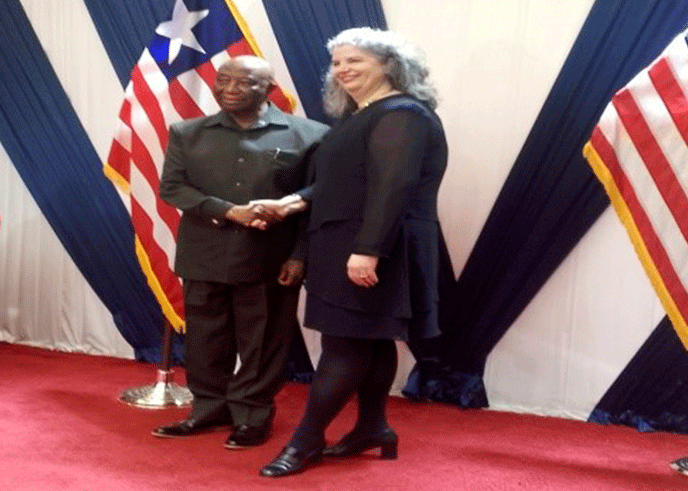The Ellen Johnson-Sirleaf Ministerial Complex in Congo Town was a scene of excitement and a colorful celebration on Thursday, June 27, 2024, when the U.S. Embassy in Monrovia commemorated the 248th Independence anniversary of the United States of America.
America’s Independence Day is celebrated officially on July 4 every year, but the U.S. Embassy in Monrovia usually observes the historic day before the actual date.
At the event attended by President Joseph Nyumah Boakai and top officials of the Liberian Government, the Chargé d’/Affaires of the US Embassy Catherine Rodriguez cherished the enduring friendship and partnership and the remarkable history of Liberia and the United States share.
“Today, we gather to celebrate the founding of the United States, 248 years ago with the signing of the Declaration of Independence on July 4, 1776. It is a unique opportunity to celebrate the birth of our nation in Monrovia, a city named after our fifth president. Our countries share an extraordinary history which dates back to 1822 when the first African Americans settled in Liberia, paving the way for a new nation.
July 4th is a time for celebration according to Madam Rodriguez as they celebrate with fireworks displays and reflection on the historic founding. “For us, we reflect on what it is to be an American. America is an idea. It is also a melting pot of people from every country around the world. Our country is not defined by a particular race, ethnicity, religion, heritage, or other demographics. Instead, as a democracy, we are bound together by a national constitution which lays out the principals and rights that every citizen enjoys.”
“When we look to the opening statement in our Declaration of Independence it reads: We hold these truths to be self-evident, that all men are created equal, that they are endowed by their Creator with certain unalienable Rights that among these are Life, Liberty and the pursuit of Happiness.” She quoted.
When the founders signed the Declaration of Independence, these principals were true for some, but not for all the inhabitants of the U.S. In those times, there was slavery, women had few
rights, and the whole idea of a democracy in a time of kings and autocratic rulers was radical. But even in those times, the founders understood the need for change as they wrote in the preamble to our Constitution the need to form a “more perfect union”. Creating a perfect union is not a destination that can ever be fully realized, but rather a perpetual journey.
According to her, no country can have a perfect union of its people, but democracy gives every citizen the tools to make progress towards that goal through protecting free speech, preserving a free press, holding free and fair elections to keep government accountable, and maintaining a fair justice system to seek redress.
She said in the U.S., the struggles have been many ranging from the civil war to end slavery, to the 19th amendment granting women the right to vote in 1920, to the Civil Rights and Voting Rights Acts in the 1960s, to the Americans with Disabilities Act of 1990, to establishing rights of the LGBTQI Community; stating that, Americans have made steady progress, but it remains unfinished.
Our history with Liberia is indelibly linked. Liberia shares a deep cultural and historic tie with the U.S. Like any country, it also has its own struggles, including coming to grips with its own civil wars through the establishment of a war crimes court to address the wrongs of the past. Liberia has just undergone a free and fair election and peaceful transfer of power. This is a testament to Liberia’s commitment to democracy by its people, political parties and the hard work of the National Elections Commission, international observers, and the Joint Security Team. It set the example for other countries to follow. Liberia is moving forward to try to address corruption, institute accountability, improve education, and foster economic development. This quest requires the full participation of its citizens to work together, and we stand as a strategic partner for Liberia in its effort to form its own more perfect union for its entire people.
She expressed heartfelt gratitude to Liberians for their warm hospitality and friendship and calls on her fellow citizens to take pride in America with a renewed sense of purpose in the mission to support peace and democracy around the world.
In a joyful moment, President Joseph Nyumah Boakai said to see the people of America clocking almost two centuries and half years of statehood, while Liberia as a sisterly nation are following closely to mark its 177th years as a Republic in July is an exciting moment.
The Liberian President extended his gratitude for the long, helpful, rewarding and promising relationship that has subsisted between Liberia and the United States from the founding of Liberia; as such restated his commitment to further deepening and strengthening the relationship of the two countries.
“From day one of the ushering in of my Administration, I came to view the moment as a golden opportunity for the opening of a new and clean chapter in our relationship,” he mentioned.
His expectation is that the relationship be a period of honesty, respect, transparency, equity, and probity; adding that, “this would be a time that the fruits of our partnership go to directly and positively impact the conditions of our people and elevate the image of our country.”
President Boakai said his hope, dream and prayer for the nation is that, Liberians have more than forcefully sounded determination to ensure that his people do not indulge in business as usual.
“We pledge to lead by example and to ensure that the use of the products of our partnership bring relief and satisfaction to all who have invested in it,” the Liberian President indicated.
President Boakai further said that his arms are open to embrace the new era of productive and mutually beneficial relationship with the United States, which is Liberia’s traditional ally. “We join you as you savor your moment of clocking 248 years of existence a viable and exemplary Republic.”



